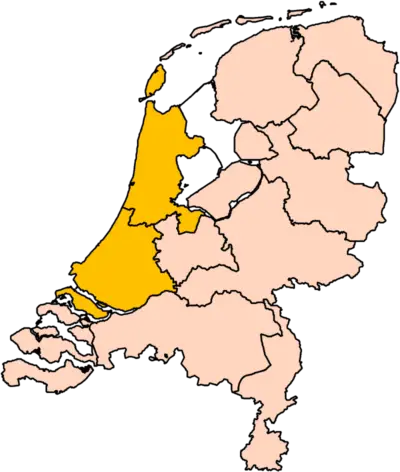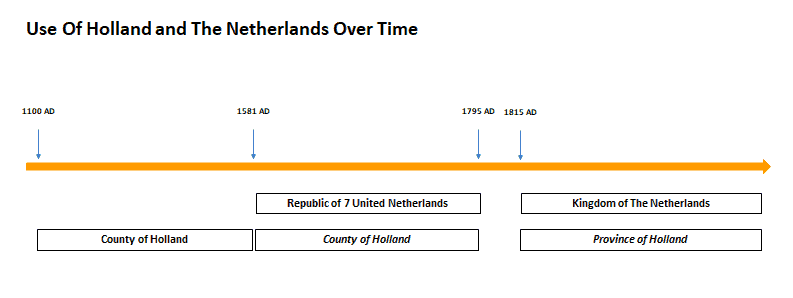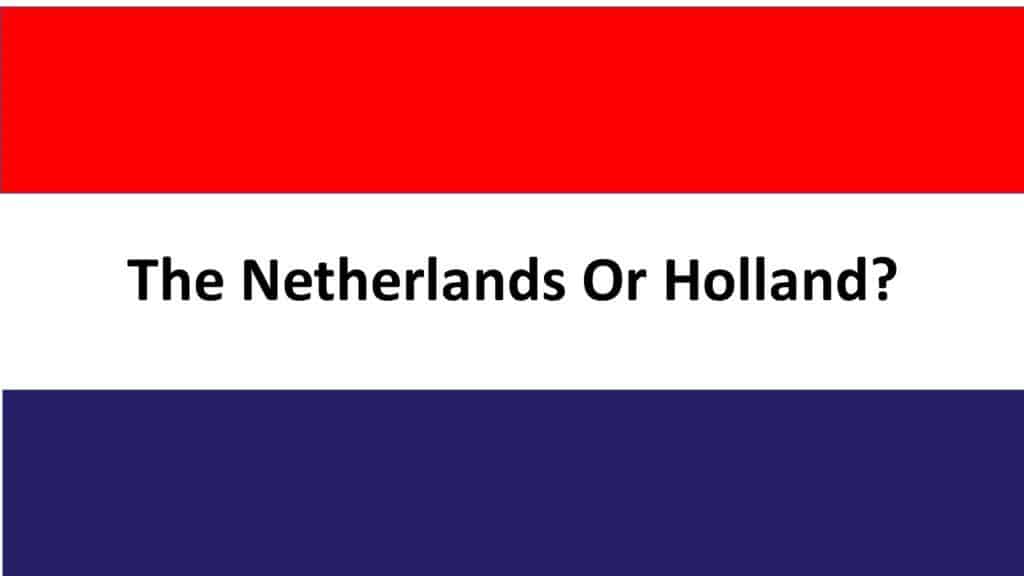Why is The Netherlands called Holland is a question asked by many visitors to our country?
Indeed, using two names to describe the same country is rather peculiar.
As a Dutch citizen, I am happy to clear up any confusion by explaining where the names Holland and The Netherlands come from.
Discover the reasons why The Netherlands is called Holland
The Netherlands is called Holland because Holland has always been the most important and influential part of The Netherlands.
Linguists call using a part (Holland) to describe the whole (Netherlands) a metonymy.
So let’s dive deeper into the fascinating history of these names to understand why The Netherlands is also called Holland and help you better understand our Dutch historical identity.
Why Is The Netherlands Called Holland
| Year | The Netherlands or Holland? |
|---|---|
| 1100 – 1581 | The county of Holland existed as an independent county |
| 1581 – 1795 | The county of Holland became part of the Republic of 7 United Netherlands |
| 1815 – 1840 | The Province of Holland became part of the Kingdom of The Netherlands |
| 1840 | The Province of Holland was split into North Holland and South Holland. Both Provinces remained part of the Kingdom of The Netherlands. |
When Did Holland Become The Netherlands?
The name Holland was used much earlier than the name The Netherlands. Holland is derived from the old Dutch word Holtland, which means woodland in English. Holtland changed to Holland, and the county of Holland was founded ± 1100.
This historical evolution sheds light on why The Netherlands is often referred to as Holland, as the region of Holland historically represented the most significant and influential part of the country.
The county of Holland, abbreviated to Holland, was an independent county ruled by the Counts of Holland, who resided in The Hague.
Holland was located in the western coastal part of The Netherlands and is yellow on this map of The Netherlands.
Holland remained independent until 1581 when it became part of the Republic of 7 United Netherlands, as The Netherlands was called in those days.

Centraal Bureau voor de Statistiek)
The first use of the name The Netherlands was in the 15th century, much later than the first use of the name Holland.
Nederland is the Dutch word for The Netherlands and Neder means low or down. Therefore, The Netherlands refers to the geographical location of The Netherlands as a low-lying country.
In the 16th century, the county of Holland allied with neighboring counties and provinces to form The Republic of the 7 United Netherlands, a precursor of The Netherlands, and gain independence from Spain.
The name Holland was often used to describe the Republic of the 7 United Netherlands, even though Holland was only one of the 7 Netherlands. However, Holland was by far the wealthiest and most powerful part and came to represent the entire country.

The fact that the coalition existed of seven independent counties explains why our country is called The Netherlands (plural, with an s) instead of The Netherland.
Native English speakers may also wonder why it is The Netherlands instead of Netherlands, but that seems to be a matter of historical habit.
The Republic of the 7 United Netherlands ceased to exist in 1795 when France occupied it under Napoleon Bonaparte.
After the defeat of Napoleon Bonaparte, In 1815, the Kingdom of The Netherlands was founded.
As a result, the former county of Holland became a province of The Netherlands. In 1840, Holland was split into two provinces, North Holland and South Holland, to decrease its political influence.
I have also prepared a table illustrating how the names Holland and the Netherlands were used over time.
Do The Dutch Call It Holland Or The Netherlands?
You may wonder if the Dutch call their country Holland or The Netherlands.
Dutch call their country The Netherlands, even those living in North Holland or South Holland. On the other hand, the Dutch don’t care if foreigners use the name Holland to describe The Netherlands. Therefore, it is not offensive to call the Netherlands Holland.
I live in the province of South Holland but don’t use Holland to describe The Netherlands. However, I don’t care if The Netherlands is called Holland or if Holland is called The Netherlands. The names Holland and The Netherlands are completely interchangeable for me.
In 2019, the Dutch government decided to stop using Holland in official writings and communications to describe our country. Instead, the government tried to rebrand The Netherlands to redirect some of the tourists to Amsterdam and Holland to other regions of The Netherlands.

Is Amsterdam Located In Holland Or The Netherlands?
Amsterdam is located in the province of North Holland and, therefore, in Holland and The Netherlands.
The location of Amsterdam in Holland was the most important reason that Holland was such a rich and influential part of the Republic of The 7 Netherlands. Most merchants and traders lived in Amsterdam and became incredibly wealthy when Dutch merchant ships explored the globe in the 17th century.
The Dutch Golden Age, a period of unprecedented economic growth and cultural flourishing in the 17th century, centered primarily in Holland, particularly in cities like Amsterdam, Leiden, and Haarlem.
This era marked a pinnacle of Dutch art, science, trade, and military power, further cementing Holland’s reputation as the heart of the Netherlands and contributing to its enduring significance in Dutch history.
The dominance of Amsterdam and Holland has always been a problem in The Netherlands. To decrease the prominence of Amsterdam, the Dutch government and the Dutch king reside in The Hague even though Amsterdam is the capital of The Netherlands.
Frequently Asked Questions
Why Are The Dutch Called Dutch?

The term “Dutch” originates from the Old English word “deutsch” which referred to the people of the Netherlands and Germany.
Over time, it evolved to specifically denote the inhabitants of the Netherlands.
Why Is Orange The National Color Of The Netherlands?

The Dutch wear orange because orange symbolizes national unity, and the Dutch signify national pride by wearing orange.
Orange refers to the family name of the Dutch Royal Family, the House of Orange-Nassau, whose ancestor, William of Orange, founded the Netherlands.
